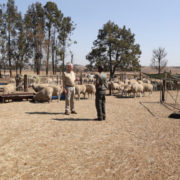by Lionesses of Africa Operations Department
Last weekend we asked you to reach for your inner Steve or Elon a.k.a. ‘war leaders’ (ok, we did say ‘not too much Steve or Elon’ – as these are 100% ’power, drive and complete belief’ that would completely exhaust many of us mere mortals on the best of our days), to keep ourselves and our decision making focused and processes nimble for what looks like difficult times ahead. As troubles rush towards Africa in the form of inflation; lack of staple foods, cooking oils and fertilizers (see here); ongoing droughts in East Africa; western Central Banks raising interest rates and cutting off at the kneecaps the fix of cheap money that has kept the globe hooked (and a rush to higher yielding investments – such as in Africa), it could create recessions, civil unrests, and so on.
This weekend we remind ourselves why balance is so important in these situations, because no matter how great our decisions, if all our employees get up and leave, or we collapse due to lack of sleep, how daft is that?
There is absolutely no doubt that Covid pushed incredible pressure onto all leaders, especially those in business with the responsibilities of employees. This was quickly followed by supply chain issues and now inflation has reared its ugly head with the threat of recessions as Central Banks ratchet up interest rates. At the best of times very few of our friends or family understand the pressures that daily we have to face. Yet in recent years and months these pressures magnified tenfold as they widened into areas we previously thought safe, and then increased in speed so that decisions that could be made over a week BC (Before Covid) then had to be made in the moment in order to save the company and all the employees’ jobs. As we have discussed recently it seems as if the Tsunamis just keep on coming…and it takes a very special leader to keep on going at times like these.
Wartime leaders such as Steve Jobs could make daring decisions and then lead the company through the thick bushes into the open pastures that he, and he alone, had seen on the other side. Although we are not like Steve (who is?), we have all recognised in the past 24 months the true meaning of the phrase: “The buck stops here!”, as we have had to make earth shattering decisions almost daily, whilst keeping some semblance of our true character alive.
This true character is so important. People have followed you, not a book, not a theory, not an order sent down from on high. You are the one who has given meaning to what they do. Often this is due to a natural empathy, often due to natural leadership. Often it is simply the ability to bring people along on your journey by giving them ‘meaning’. This ability to give meaning is so important.
How can we do that?
We hear of many companies loudly proclaiming that ‘We take care of the people’ as in:
“We take care of the people, the products, and the profits
– in that order.”
There is no doubt that free coffee, muffins and gym memberships have a certain appeal, but ultimately to ‘take care of the people’, ‘meaning’ is what is required.
But what is ‘meaning’?
Management thinker Manfred Kets de Vries in his book, ‘The CEO Whisperer’ (here) comes to our aid: “What is meaning? In the first place, it has to do with belonging, having good friends and family members. That’s the most important thing. The second thing is having some purpose in life…The third thing has to do with competence.”
So Belonging, Purpose in Life, and Competence.
Belonging. That ability to create teams from individuals. As often quoted by Melanie –
“If you want to go fast, go alone.
If you want to go far, go together.”
Create those teams and where there is no obvious way of creating a team, encourage talking and working together between employees and departments. For example, this ‘them and us’ attitude in many companies between Sales and Support Staff is a nightmare. Bang some heads together – make it work. Sales teams do better when the support staff watch their backs, and support staff are far more engaged when being part of the bigger picture, rather than feeling they are just shut in a back room. It’s not rocket science! As it starts to work, then encourage them to recognize the success in what they have done in coming together.
Purpose in Life. We recently asked the question – ‘How do we create the opportunity for our employees to become more invested in our dream, to truly believe they are working for a great company, to deeply ‘like their job’?’, in two articles here and here, pushing the essential issues: ‘Your purpose, your cause, your belief. Why does your organisation exist? Why do you get out of bed in the morning and why should anyone care?’ Answer these and you will find the meaning your employees are looking for, to give them a purpose in their working lives.
Competence. According to McKinsey (here): “Companies around the world spend up to $100 billion a year to train employees in the skills they need to improve corporate performance—topics like communication, sales techniques, performance management, or lean operations. But training typically doesn’t have much impact.”
Why is this? And what are we missing?
Apparently, “[w]hen senior leaders focus on making training work—and get personally involved—improvement can come rapidly…The most significant improvements lie in rethinking the mindsets that employees and their leaders bring to training, as well as the environment they come back to afterward.”
Two things strike us with these comments – ‘when senior leaders …get involved…’ and ‘…rethinking the mindsets that employees and their leaders bring to training’.
There is absolutely no doubt that senior leadership involvement makes a huge difference – at its most basic level this gives employees a chance to see, hear, listen to, but most importantly – be listened by senior management. In many of our companies there is not a middle management, a senior management and then the C-Suite, instead the employees see us as Founder everyday in the factory or shop floor as the management structure is very flat, but this is still important. When there is training, we have to be involved.
Rethinking the mindsets. Somehow we need to move training from the classroom style of school to something that is actually wanted by the employees themselves. That is why so many teachers are shocked when they teach an adult class rather than their usual one packed with (bored?) teenagers. The adult class is full of people who have made a conscious decision to learn. They want to be there and this conscious decision is so powerful. The teenagers? Apart from the occasional ‘Hermione Granger’ types ever eager to answer the questions in class, most are thinking of the next party or where to meet their friends (and why not – life is far too serious when after school!).
So training should be interesting – of course there is the ‘don’t put your fingers under that industrial hammer’ training, but that is on-the-job training (certainly health and safety training too!). But the way to truly motivate and to give meaning is to encourage all employees to reach for the stars and challenge themselves. That is why all training, be it a new product or a new way of doing things, or simply encouraging employees to push themselves in a new area, should be open for all. That includes general business learning, and interesting discussions of global events (that may or may not impact).
By putting employees into silos and insisting on employees just being trained in their particular area, learning is stifled and with it potential growth. Likewise, think outside the company – if there are employees who have never finished their Matric as they had to leave school at a very early age to help at home, this is your moment for true leadership, support and encouragement.
Finally, open up your company to make it a safe space for all employees.
As Manfred says:
“When employees feel comfortable asking for help, sharing suggestions informally, or challenging the status quo without fear of negative social consequences, organizations are more likely to innovate quickly, unlock the benefits of diversity, and adapt well to change.”
Finally, take some time for yourself. You are only human.
Full diary? As Manfred says:
“Are you out of your mind?
Cross out some afternoons, walk around and think.”
Now there’s sensible advice for all of us!
Stay safe.


















